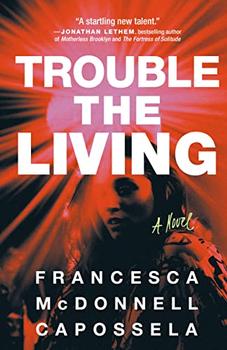Summary | Excerpt | Reviews | Beyond the book | Read-Alikes | Genres & Themes | Author Bio

Most of us have heard the slightly trite saying: "If you love something, set it free." But one can safely assume that Catherine Reilly, the primary protagonist of Tender, a marvelous novel about love morphing into obsession, never received the memo.
When Catherine begins at Trinity College, Dublin the only handy guidebook she goes by is based on a claustrophobic and conservative upbringing in a Catholic household in the Irish countryside. Dublin might not be too far from home in Longford County, but for all practical purposes it might as well be on another planet. Here in the big bad city in the 1990s, college and its complexities are difficult enough to wrap one's head around, when along comes the funny, articulate and brilliant James Flynn, a young man too smart for college, who instead works occasional gigs as a photographer. Catherine does not quite know how to process James' seemingly bold outtakes on societal norms, and as he gently mocks her conventionality, and dares her to color outside the strait-laced life her parents have implicitly outlined for her, Catherine is floored. Yes, she decides, this is love, and soon she is giddily immersed in its many splendors.
Unfortunately, James, for intensely personal reasons, does not reciprocate. On one level it seems that Catherine has mistaken his way of being with all friends as something that's exclusive only to her. So taken in is Catherine by James' funny quips and ease that she wants to live only in the present, sharing his music, hanging on his every word. But the gilded fairy-tale castle that Catherine has built for herself, brick by brick, ignoring other male classmates' advances, is laid on a foundation of delusion and is bound to implode.
Up until Tender's brilliant denouement, Catherine's carefully constructed world leaves no room for anything that might stray from the script. Once, when James returns from work in Berlin, terribly depressed, she wills it to be otherwise. While Catherine's reaction is partly based on her own inadequacies – she really doesn't know how to handle somebody with depression – McKeon flawlessly demonstrates how Catherine's obsession smooths over all kinks in the armor to feed her own grand delusion: "Catherine decided, none of that loneliness would have a chance, not a moment, to sink its misery into him, to pull his days and nights to shreds. Catherine would be with him. Everyone would be with him…everything would be more than okay."
But okay everything is not. As Catherine's obsession ratchets up in intensity, the collateral costs it leaves behind will leave the reader breathless. McKeon's brilliance lies in showcasing the emotional toll of truly growing up, of the devastation wrought by utter self-absorbedness and obsession. It might be easy for the reader to intensely dislike Catherine for the damage she so casually seems to inflict, but here, too, the story is nuanced enough to lay the blame not just at the feet of one deluded individual. "You learned your spake from the best of them. Christ, you were taught and taught well," Catherine is accused toward the end. Was her corseted upbringing, then, to be blamed for her single-minded obsession? Was James her ticket out of all that moral indignation? The answer, Tender brilliantly shows, is not as easy as all that.
Most of the novel is set in the early '90s, when the "Troubles" were very much a part of the national ethos, and those struggles permeate these pages in tangential but important ways. Both Catherine and James and their assorted friends are fans of the poets Sylvia Plath and her husband, Ted Hughes. In fact, Catherine adopts one of Hughes' lines, "What happens in the heart simply happens" as one of her own. While this line serves as a ready excuse for Catherine, it is the memorable couplet from the poem "9 Willow Street", that perhaps best describes her blinding obsession for James: "I folded / Black wings round you, wings of the blackness / That enclosed me, rocking me, infantile / And enclosed you with me."
It takes special talent to take basic, everyday story material and turn it into high art. Read this book for the audacious and brave perspective that McKeon shines on our very human vulnerabilities. Then, just like I did, read it again for the spellbinding writing. What more can I say? I can count on the fingers of one hand the number of novels that I have read twice – back to back. Tender is one of them.
![]() This review was originally published in The BookBrowse Review in February 2016, and has been updated for the
February 2017 edition.
Click here to go to this issue.
This review was originally published in The BookBrowse Review in February 2016, and has been updated for the
February 2017 edition.
Click here to go to this issue.

If you liked Tender, try these:

by Colm Toibin
Published 2025
From the beloved, critically acclaimed New York Times bestselling author comes a spectacularly moving and intense novel of secrecy, misunderstanding, and love, the story of Eilis Lacey, the complex and enigmatic heroine of Brooklyn, Tóibín's most popular work twenty years later.

by Francesca McDonnell Capossela
Published 2023
From Northern Ireland to Southern California and back―a mother and daughter confront the violence of the past in an enthralling novel about the possibility of love and redemption during the most transforming and unsettled times.
Censorship, like charity, should begin at home: but unlike charity, it should end there.
Click Here to find out who said this, as well as discovering other famous literary quotes!
Your guide toexceptional books
BookBrowse seeks out and recommends the best in contemporary fiction and nonfiction—books that not only engage and entertain but also deepen our understanding of ourselves and the world around us.